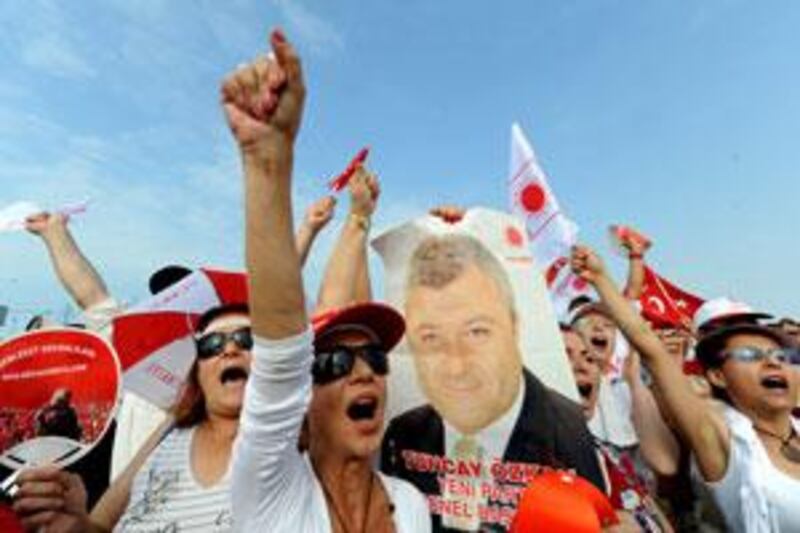ISTANBUL // In a politically charged trial that has exposed tensions between ruling politicians and the military in Turkey, a court yesterday began proceedings against two former high-ranking generals and other suspects accused of plotting to bring down the government of prime minister Recep Tayyip Erdogan.
The charges were brought against Hursit Tolon, a former commander of Turkey's prestigious First Army Corps, and Sener Eruygur, a former leader of the gendarmerie, as well as 54 other suspects. They are part of a wide-ranging investigation against a right-wing group named Ergenekon, which prosecutors claim gathered arms and intelligence, named hit squads and committed terrorist attacks in an effort to provoke a military coup.
Prosecutors seek multiple life sentences against both Mr Tolon and Mr Eruygur for leading Ergenekon and organising such attacks as the killing of a high-ranking judge in Ankara in 2006. According to the prosecution, that murder was committed to create the impression that Islamist extremists were running amok in Turkey. For the same reason, Ergenekon organised a hand grenade attack on the building of an opposition newspaper, the prosecution argues.
Several dozen other Ergenekon suspects, among them former and serving army officers, have been on trial since last autumn. But the new group, charged under an indictment that is 1,909 pages long, includes so many high-profile government opponents that observers said yesterday's start of the second trial marked the decisive moment of a legal saga that many regard as a watershed for Turkey. "The real trial starts now," columnist Okay Gonensin wrote in the Vatan newspaper.
For Turkey, the Ergenekon trial is new territory, marking the first time that leading members of the military have to face justice over suspected plots against an elected government. In a controversial decision last month, parliament passed a law that gives the civilian judiciary more power to put military officers on trial, although the constitutional court may annul it. The case of Ergenekon, named after the mythical home of the Turks in Central Asia, has divided public opinion and has brought tensions between civilian and military leaders in Ankara into the open.
The Turkish military, which has pushed four governments from power since 1960 and regards itself as the guardian of secularism, has criticised what many officers see as Islamist tendencies under the current government and even threatened a coup two years ago. Last year, the general staff made clear its concerns about the charges against Mr Tolon and Mr Eruygur by sending an official delegation to visit them in prison during their time in custody.
Government supporters say the Ergenekon case shows that some elements in the army are ready to use undemocratic and violent means to get rid of a political leadership they deem a danger to secularism. Critics argue the trial includes trumped-up charges and is a politically motivated government ploy to blacken the military's image. Yesterday's trial kicked off in a specially built courtroom in a prison in Silivri, a town 30km west of Istanbul that became the home of the Ergenekon proceedings last year because of the large number of suspects. The judge now has to decide whether to unite the Ergenekon cases.
A third indictment dealing with Ergenekon and including a further 52 suspects has also been sent to the court, news reports said yesterday. If the court accepts it, the total number of people charged in connection with Ergenekon will be close to 200. Outside the prison complex, about 50 people supporting Tuncay Ozkan, a journalist and Ergenekon suspect, shouted slogans. Some of them wore T-shirts with a picture of Mustafa Kemal Ataturk, the founder of modern Turkey. Another group from the Human Rights Association, a leading rights group, also gathered in front of the prison and demanded that those responsible for extrajudicial killings in Turkey's Kurdish region in the 1990s face justice.
One of the accused in the Ergenekon trial, Levent Ersoz, a former military officer, has been named as a key figure in those crimes. Mr Tolon, who was freed after seven months in custody, appeared in court yesterday, but Mr Eruygur, released from custody for health reasons, did not. Another high-profile suspect in the courtroom was Ferda Paksut, the wife of a judge of Turkey's constitutional court, who is known as a government critic.
Mrs Paksut is accused of aiding Ergenekon. As the judge began proceedings in Silivri by checking the identity of the accused, the future of the trial was unclear. In Ankara, a body charged with staffing courts and prosecution offices around the country and made up of judges and government representatives was locked in a bitter row about whether or not key players in the Ergenekon trial should be changed.
According to press reports, government critics in the body, the High Council of Judges and Prosecutors, have been pushing to have the leading prosecutor in the Ergenekon trial, Zekeriya Oz, removed from the case. Even media that have been critical of the government have appealed to the council to leave Mr Oz on his post, because his removal would smack of interference. @Email:tseibert@thenational.ae






